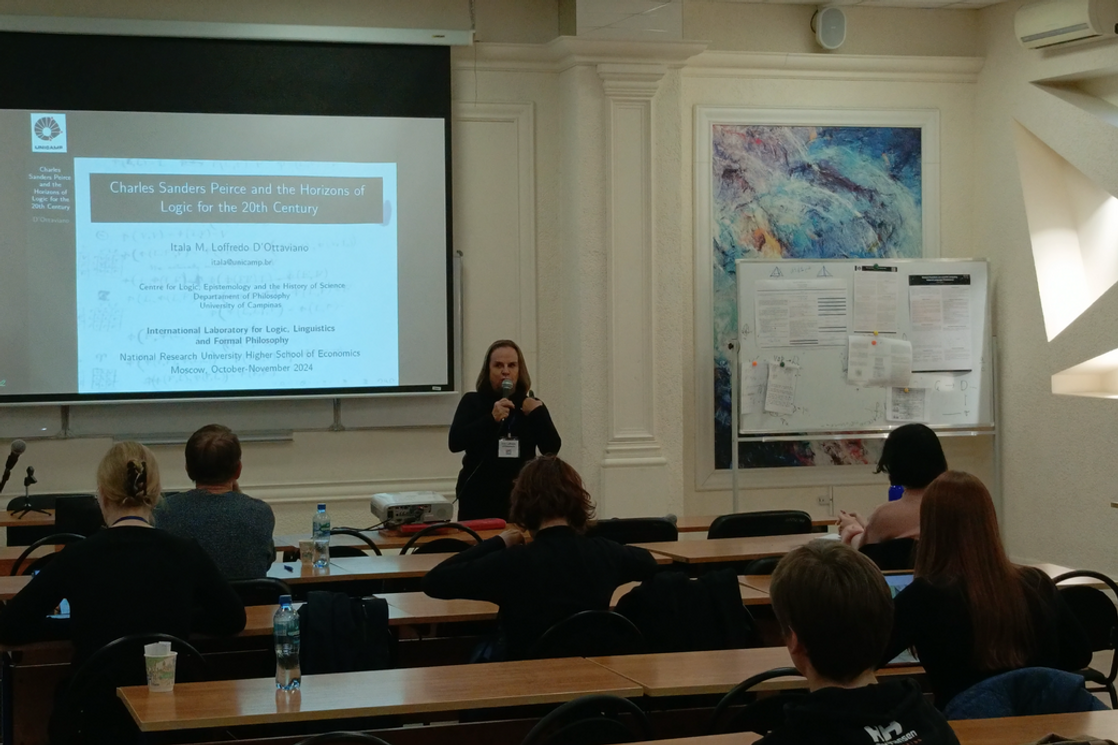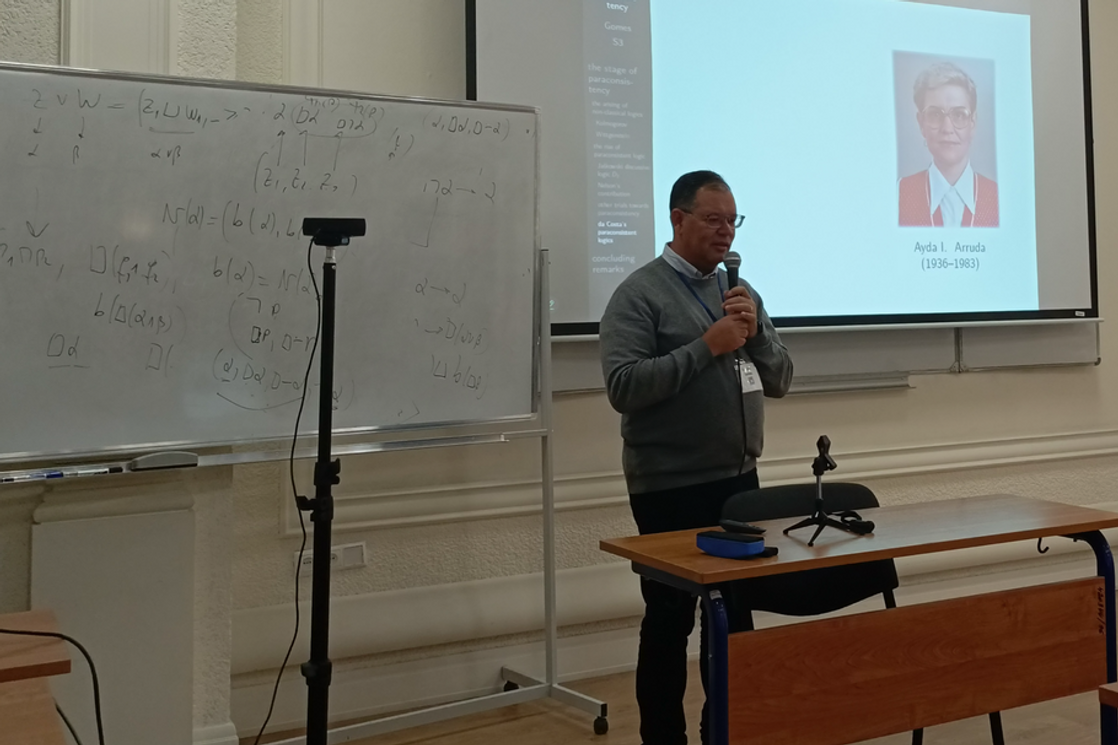Bringing Maths and Philosophy Together: Russian-Brazilian Project Explores Logical Pluralism
In late October and early November, HSE University hosted the Autumn School on ‘Logic and Formal Philosophy’ and a conference on logical pluralism as part of a collaborative project uniting Russian and Brazilian philosopher-logicians and mathematician-logicians. The project’s leaders and participants, Elena Dragalina-Chernaya, Itala Loffredo D'Ottaviano, Marcelo Esteban Coniglio, and Evandro Luis Gomes, shared their insights about the initiative.
The joint project ‘Pluralist Perspectives on Logic and Formal Philosophy’ is a collaboration between the HSE International Laboratory for Logic, Linguistics and Formal Philosophy (LLFP) and the Centre for Logic, Epistemology, and the History of Science (CLE) at the University of Campinas, Brazil. It focuses on addressing the meta-mathematical and methodological challenges arising from the pluralism of logical systems. Running from 2024 to 2026, the project brings together researchers from both countries.
As part of the joint project, the Autumn School on ‘Logic and Formal Philosophy’ and a conference on logical pluralism dedicated to the memory of Newton da Costa—a renowned Brazilian mathematician, logician, and philosopher who passed away in 2024—were held at HSE University. This autumn, Brazilian colleagues also participated in LLFP’s annual ‘Formal Philosophy’ conference.
Elena Dragalina-Chernaya
‘Our partner in this joint project, the Brazilian Centre for Logic, Epistemology, and the History of Science at UNICAMP, has nearly 50 years of history. It was founded in 1977—15 years after the university itself. According to recent data from Brazil’s Ministry of Education, UNICAMP has become a leading institution in the country. In 2014, the first cooperation agreement between UNICAMP and HSE was signed. Our academic partnership with CLE began through joint conferences, monographs, and academic exchanges. The choice of this topic stems from the mathematical and methodological challenges posed by the diversity of logical systems, requiring collaborative efforts from philosopher-logicians and mathematician-logicians.
Our team includes philosophers such as project leaders Fabio Bertato, Itala Loffredo D’Ottaviano, and myself, as well as Evandro Gomes, Vladimir Vasyukov, and Vitaly Dolgorukov, along with mathematicians Walter Carnielli, Marcelo Coniglio, Rodolfo Biraben, Mikhail Rybakov, Daniyar Shamkanov, Anastasia Onoprienko, and Denis Fedyanin. Students and graduate students participating in the project also represent the philosophical and mathematical schools of our universities.
The project's outcomes, like any research endeavour, will primarily manifest in a series of publications in high-ranking journals and presentations at international scientific conferences.
We plan to hold annual Russian-Brazilian workshops on logical pluralism
The first one has just recently been held at HSE University in memory of Newton da Costa, the patriarch of Brazilian logic.
Earlier, in October 2024, the Russian-Brazilian Autumn School on ‘Logic and Formal Philosophy’ was held. Such schools will be conducted regularly. We aim to integrate and further develop the well-established traditions of CLE and LLFP's logic schools. The school involved students, graduate students, and young researchers in philosophy, mathematics, computer science, as well as linguists, psychologists, and other specialists interested in modern logic.
The prospects for studying logical pluralism are tied not only to the anticipation of inspiring mathematical results that satisfy our scientific curiosity or their planned applications in computer science, but also to the hope of gaining a deeper understanding of the premises and limits of our rationality, fostering dialogue across different sciences and cultures
Itala Loffredo D'Ottaviano, Full Professor in Logic and the Foundations of Science Centre for Logic, Epistemology and the History of Science University of Campinas, Brazil, is a long-term partner of the HSE laboratory and has visited Moscow many times. She talks about the significance of cooperation with the Russian university and further prospects.
Itala Loffredo D'Ottaviano
‘Collaboration with HSE’s Laboratory for Logic, Linguistics and Formal Philosophy under the framework of a special agreement between our universities is immensely important. Russian scholars—mathematicians and philosophers of the 20th century—have significantly advanced science, and their influence in the 21st century remains immense. We study their legacy and strive to contribute to the development of science.
Exchanging scientific opinions and engaging in discussions in Moscow has been incredibly engaging and valuable. My colleagues and I delivered presentations and participated in the sessions of the Autumn School and the workshop five to eight times.
I would like to highlight the high level of preparation demonstrated by the students who participated in the discussions. At first, they were a bit hesitant to ask questions and speak up, but they quickly adapted to the working rhythm and posed important and complex questions about the topics of our presentations
Brazilian scholars presented several reports, including ‘Horizons of Logic for the 20th Century: Russian Contributions to Non-Classical Logics– Andrei Kolmogorov, Ivan Orlov, Valery Glivenko, Dmitry Bochvar’, ‘Charles Sanders Peirce and the Horizons of Logic for the 20th Century’ (Itala Loffredo D’Ottaviano); ‘Non-Deterministic Matrices and Swap Structures Semantics: Applications to Non-Classical Logics and Combination of Logics’, ‘Truth-Tables for Intuitionistic Propositional Logic: A New Interpretation and Decision Procedure Based on Restricted Non-Deterministic Matrices’, ‘On First-Order Ivlev-like Modal Logics’ (Marcelo Esteban Coniglio); ‘Beyond the Columns of Hercules, a History of Paraconsistency: from Heraclitus of Ephesus to Stanisław Jaśkowski and Newton da Costa’, ‘The Mirror Has Two Faces: Logical Pluralism from the Perspective of da Costa and Quine’ (Evandro Luis Gomes).

Marcelo Esteban Coniglio, Full Professor at the Department of Philosophy and Vice Director of the Centre for Logic, Epistemology and the History of Science at the University of Campinas, is a fan of Russian culture and history. He is one of the co-authors of the book ‘Many-values Semantics and Modal Logics: Essays in Honour of Yuriy Vasilievich Ivlev’ alongside editors Ekaterina Kubyshkina and Dmitry Zaitsev.
Marcelo Esteban Coniglio
‘It was a great honour for me to work on this book. Yuriy Ivlev is one of the outstanding philosopher-logicians whose works are not widely known internationally because they were mostly published in Russian.
In fact, the works of Russian scholars, such as mathematician Andrey Kolmogorov, were foundational texts in Brazil when I was a student
One of the goals of our joint project, of which I am proud to be a part, is to develop and deepen scientific ideas and actively involve students in research on the problems of logic and the interplay of its different schools.’

Evandro Luis Gomes, Professor, Department of Philosophy, Graduate Programme in Philosophy, State University of Maringa, Parana, Brazil, also emphasised the importance of historical legacy for contemporary researchers in logic and philosophy, particularly the contributions of Russian scholars.
Evandro Luis Gomes
‘The organisation of the school and workshop was excellent. The presentations and discussions were a source of inspiring motivation for my future work. I would also like to highlight the outstanding work and engagement of the students, with whom it was an absolute pleasure to interact. I am confident that international scientific cooperation between Brazil and Russia will be both interesting and fruitful.’

See also:
‘Brazilians and Russians Share a Unique Connection’
Tobias Vilhena de Moraes is a historian working at Museu Lasar Segall inSão Paulo, Brazil, and a faculty member of the Institute of Philosophy and Human Sciences at the University of Campinas. He is now working on a master’s degree at HSE University-St Petersburg.
‘The Defence Was Both Interesting and Nerve-Wracking’
Ana Livia Araujo Esteves, from Brazil, lecturer at the HSE School of International Regional Studies, has recently defended her PhD at HSE University. In her interview with the HSE News Service, she talks about her research into Brazilian–Russian relations, the difficulties of the thesis defence process, and her further plans in academia.
HSE and University of Campinas Celebrate World Logic Day Together
On January 15, 2025, the Russian-Brazilian Colloquium on Logical Pluralism was held at the HSE International Laboratory for Logic, Linguistics and Formal Philosophy to mark World Logic Day. This event was part of the joint project ‘Pluralistic Perspectives on Logic and Formal Philosophy,’ implemented by the laboratory and the Centre for Logic, Epistemology and the History of Science at the University of Campinas (Brazil) under the International Academic Cooperation competition.
‘Philosophy Is Thinking Outside the Box’
In October 2024, Louis Vervoort, Associate Professor at the School of Philosophy and Cultural Studies of the Faculty of Humanities presented his report ‘Gettier's Problem and Quine's Epistemic Holism: A Unified Account’ at the Formal Philosophy seminar, which covered one of the basic problems of contemporary epistemology. What are the limitations of physics as a science? What are the dangers of AI? How to survive the Russian cold? Louis Vervoort discussed these and many other questions in his interview with the HSE News Service.
HSE University Negotiates to Launch Joint Projects with Leading Universities in Brazil
In the framework of the academic mission to Latin America, HSE University-St Petersburg has negotiated to launch joint projects with leading Brazilian universities. Thus, with the University of São Paulo, the first in the QS ranking among Brazilian universities, HSE plans to carry out joint research aimed at supporting biodiversity, developing biotechnologies and solving ecological and social issues.
HSE University to Expand Cooperation with Brazilian Universities
On October 14, 2024, International Partnership Day Russia–Brazil took place at HSE University. The event was organised in collaboration with the Brazilian Embassy in Moscow and marked the first Brazilian academic and scientific mission to Russia, leading to the signing of cooperation agreements between HSE University and four Brazilian universities.
‘It Is Absolutely Necessary for Scholars and Students to Be in Contact with Peers Around the World’
Bruno de Conti, Assistant Professor at the University of Campinas (Unicamp, Brazil), has been cooperating with the HSE School of International Regional Studies for a few years. In his interview with the HSE News Service, he talks about the importance of developing academic cooperation between Russia and Brazil and shares his impressions of HSE University and Moscow.
‘I Am Able to Tell My Students Things That I Always Wanted to Tell People in Russia’
Ana Livia Araujo Esteves, from Sao Paulo, Brazil, is a journalist, a third-year doctoral student of International Relations, and visiting lecturer at the HSE School of International Regional Studies. In her interview for the HSE News Service, she speaks about her motivation to carry out research and teach students in Russia, shares some tips for people from Latin America living in Moscow, and talks about why a dog can be a reason to stay in Russia for just a bit longer.
Artificial Intelligence Tested by Kant Philosophy
The Baltic Federal University (Kaliningrad) recently hosted an International Congress entitled ‘The World Concept of Philosophy’ in honour of the 300th anniversary of the birth of the philosopher and thinker Immanuel Kant. The event brought together about 500 scientists and experts from 23 countries. HSE Rector Nikita Anisimov took part in the opening plenary session of the congress titled ‘Critique of Artificial Intelligence: Being and Cognition in the Context of Artificial Intelligence Development.’
The Perfect Trap: How the Relationship between Humans and AI Is Transforming
Artificial intelligence is increasingly becoming an integral part of our life. We are now so used to its help and services that we get completely lost when we can’t connect to the internet. Could a person fall in love with AI? What will its humanisation lead to? These and other questions were discussed at this year’s LSES Christmas movie seminar, which was dedicated to Spike Jonze's film Her.


